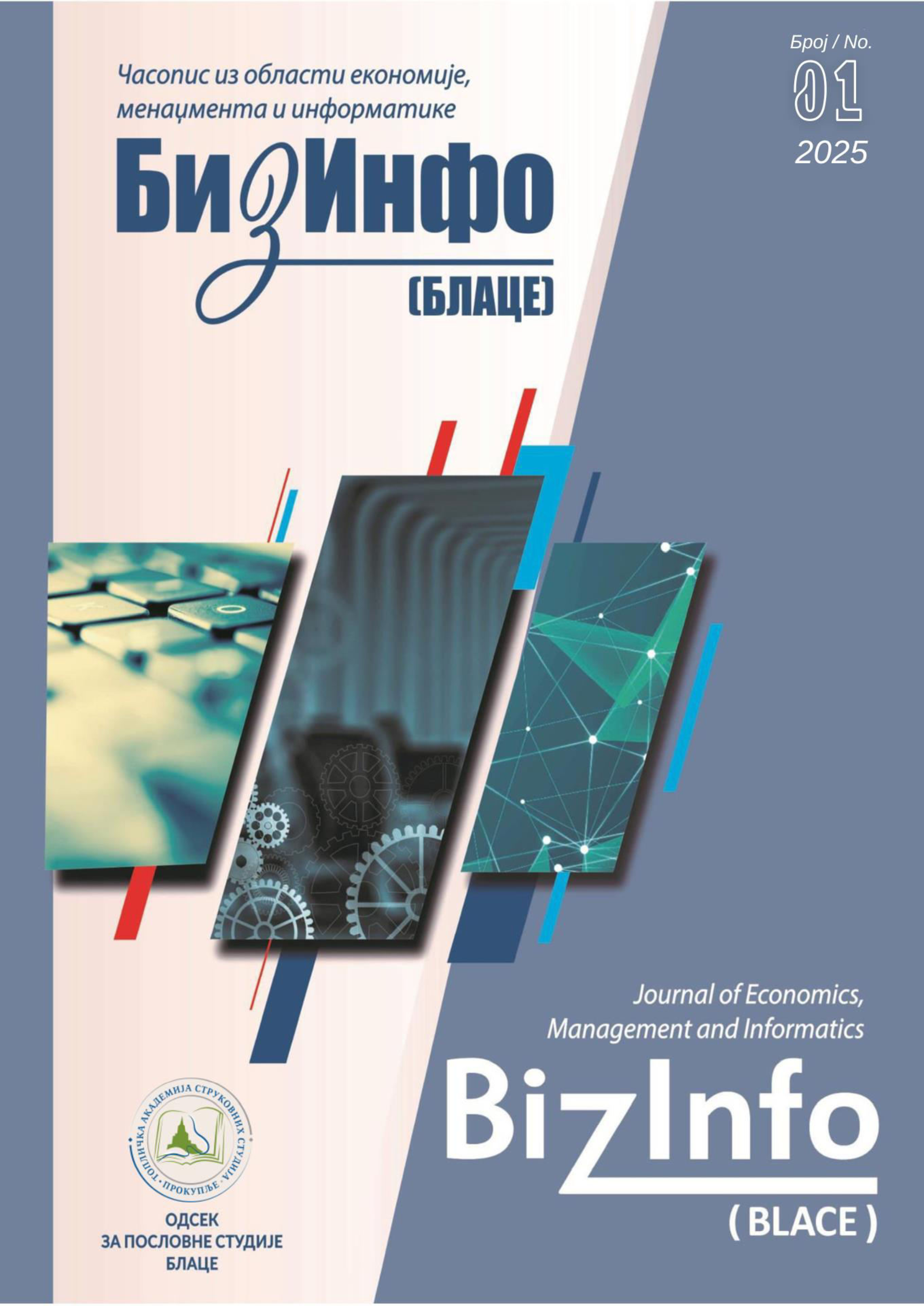Pro-environmental practices and green solutions adoption in Western Balkans hotels: transformative path to enhance sustainability
DOI:
https://doi.org/10.71159/bizinfo250015RKeywords:
green solutions, green training, green rewards, sustainability, Western Balkan hotelsAbstract
In the rapidly evolving landscape of hospitality, the emphasis on sustainability and environmental stewardship has gained unprecedented momentum. Hotels, as significant consumers of resources and contributors to waste, are increasingly recognizing the imperative of adopting green splutions. The paper started from the initial hypothesis H that different green solutions are a long-term path to achieving sustainable and responsible business in hotels. Research conducted among managers and owners of hotels in mountain centers of the Western Balkans showed that among employees there is a need for a transition from classic to sustainable business. Central to this transition are two factors: green training and green rewards, which together foster a culture of sustainability within the hotel industry. This paper explores the essential role of green training in equipping hotel staff with the knowledge and skills needed for sustainable operations, the various green rewards programs that incentivize eco-friendly practices, and the overall environmental performance indicators that reflect a hotel’s commitment to sustainability. By analyzing these interconnected facets, it becomes evident that a holistic approach to environmental responsibility not only enhances the reputation of hotels but also contributes to a more sustainable future.
Downloads
References
Amayuelas, A. E. (2024). A Third Directive on Consumer Credit. European Review of Contract Law, 20(1), 1-24. https://doi.org/10.1515/ercl-2024-2001
Aboramadan, M., Crawford, J., Ali Turkmenoglu, M., & Farao, C. (2022). Green inclusive leadership and employee green behaviors in the hotel industry: Does perceived green organizational support matter? International Journal of Hospitality Management, 107, 103330, https://doi.org/10.1016/j.ijhm.2022.103330
Álvarez Gil, M.J., Burgos Jiménez, J., & Céspedes Lorente, J.J., (2001). An analysis of environmental management, organizational context and performance of Spanish hotels. Omega (Westport), 29(6), 457–471. https://doi.org/10.1016/S0305-0483(01)00033-0Dec
Aslam Janjua, N., Shi, D., & Sahibzada, U.F. (2024). Harnessing green innovation via green transformational leadership in Italian luxury hotels: Key strategic takeaways. International Journal of Hospitality Management, 120, 103739, https://doi.org/10.1016/j.ijhm.2024.103739
Barbara, E.C., D Adamo, I., Gastaldi, M., & Nizami, S.A. (2024). Clean energy for a sustainable future: Analysis of a PV system and LED bulbs in a hotel. Energy, 299, 131547, https://doi.org/10.1016/j.energy.2024.131547
Bojović, P., Vujko, A., Knežević, M., & Bojović, R. (2024): Sustainable approach to the development of the tourism sector in the conditions of global challenges. Sustainability, 16(5), 2098. https://doi.org/10.3390/su16052098
Bianco, S., Bernard, S., & Singal, M. (2023). The impact of sustainability certifications on performance and competitive action in hotels. International Journal of Hospitality Management, 108, 103379, https://doi.org/10.1016/j.ijhm.2022.103379
El-Said, A.O., Elhoushy, S. Smith, M., & Youssif, M. (2024). Crisis-driven innovation in hospitality: How do international hotel chains innovate to recover from a global crisis? International Journal of Hospitality Management, 120, 103758, https://doi.org/10.1016/j.ijhm.2024.103758
Ertuna, B., Gu, H., & Yu, L. (2022). A thread connects all beads: Aligning global CSR strategy by hotel MNCs. Tourism Management, 91, 104520, https://doi.org/10.1016/j.tourman.2022.104520
Filimonau, V., Bai, L., Romanenko, A., Tarakanova, V., & Ermolaev, A.V. (2023). How employees perceive and (dis)engage with ‘green’ practices in luxury hotels. International Journal of Hospitality Management, 114, 103567, https://doi.org/10.1016/j.ijhm.2023.103567
Galli, A., Đurović, G., Hanscom, L., & Knežević, J. (2018). Think globally, act locally: Implementing the sustainable development goals in Montenegro. Environmental Science & Policy, 84, 159-169, https://doi.org/10.1016/j.envsci.2018.03.012
Göler, D. (2018). Tourism and Transition in the Western Balkans, Albania as a Laboratory for Tourism Development. Südosteuropa Mitteilungen, 4, 88-98.
Guerra-Lombardi, V., Hernández-Martín, R., & Padrón-Fumero, N. (2024). Drivers, barriers and key practices of corporate sustainability strategy implementation in hotels. International Journal of Hospitality Management, 120, 103791, https://doi.org/10.1016/j.ijhm.2024.103791
Gulakdeniz, E., & Karadas, G. (2024). The impact of employees' perceptions regarding hotels’ green intellectual capital on their environmental perceptions: A mediating moderation model. Heliyon, 10(20), e39559, https://doi.org/10.1016/j.heliyon.2024.e39559
Hoang, T.H., Pham, T.N., Seet, P-H., Jones, J., & Ho, N.T.T. (2025). Top management green commitment and employee in-role green performance: An emerging economy study. Sustainable Futures, 9, 100432, https://doi.org/10.1016/j.sftr.2025.100432
Jerez-Jerez, J.M. (2025). A study of employee attitudes towards AI, its effect on sustainable development goals and non-financial performance in independent hotels. International Journal of Hospitality Management, 124, 103987, https://doi.org/10.1016/j.ijhm.2024.103987
Jovanović Nikolić, I., & Stojković Trajković, M. (2022). Fostering the development of future tourism and hospitality professionals’ employability skills through the use of podcasting technology. BizInfo Blace, 13(2), 21-28. https://doi.org/10.5937/bizinfo2202021J
Kennell, J., Chaperon, S., Segota, T., & Morrison, A. (2020). Western Balkans tourism policy assessment and recommendations. University of Greenwich, Regional Cooperation Councile.
Knežević, M., Pindžo, R., Ćulić, M., Kovačić, S., Dunjić, M., & Vujko, A. (2024). Sustainable (re)development of tourism destinations as a pledge for the future – a case study from the Western Balkans. Geojournal of Tourism and Geosites, 56(4), 1564-1575, https://doi.org/10.30892/gtg.56413-1327
Knezović, E., Riđić, O., & Chambas, M. A. I. (2020). Human capital and innovation: An analysis of Western Balkans. Organizational Mindset of Entrepreneurship: Exploring the Co-Creation Pathways of Structural Change and Innovation, 153-180. https://doi.org/10.1007/978-3-030-36951-4_8
Kruesi, A.M., & Remy, D. (2024). Hotel Sustainability: Balancing Environmental Responsibility and Business Success. Reference Module in Social Sciences, https://doi.org/10.1016/B978-0-443-13701-3.00249-8
Lehmann, T. & Gronau. W. (2019). Tourism Development in Transition Economies of the Western Balkans. Zeitschriftfür Tourismus wissen schaft, 11, 45-64.
Licastro, A., & Sergi, S.B. (2021). Drivers and barriers to a green economy. A review of selected balkan countries. Cleaner Engineering and Technology, 4, 100228, https://doi.org/10.1016/j.clet.2021.100228
MacAskill, S., Becken, S., & Coghlan, A. (2023). Engaging hotel guests to reduce energy and water consumption: A quantitative review of guest impact on resource use in tourist accommodation. Cleaner and Responsible Consumption, 11, 100156, https://doi.org/10.1016/j.clrc.2023.100156
Madan, P., Srivastava, S., Alzeiby, A.E., & Cao, D. (2025). Proliferating green innovative work behavior through green organizational culture: Mediating role of green ambidexterity and values in the hospitality context. International Journal of Hospitality Management, 125, 104006, https://doi.org/10.1016/j.ijhm.2024.104006
Mansi, E., Hysa, E., Panait, M., & Voica, M. C. (2020). Poverty—A challenge for economic development? Evidences from Western Balkan countries and the European Union. Sustainability, 12, 7754. https://doi.org/10.3390/su12187754
McCarroll, J.M., Thomas LaVanchy, G., & Kerwin, W.M. (2024). Tourism resilience to drought and climate shocks: The role of tourist water literacy in hotel management. Annals of Tourism Research Empirical Insights, 5(2), 100147, https://doi.org/10.1016/j.annale.2024.100147
Melović, B., Milović, N., Bačković-Vulić, T., Dudić, B., & Bajzik, P. (2019). Attitudes and perceptions of employees toward corporate social responsibility in Western Balkan countries: Importance and relevance for sustainable development. Sustainability, 11, 6763. https://doi.org/10.3390/su11236763
Míguez, L.J., Rivo-López, E., Porteiro, J., Pérez-Orozco, R. (2023). Selection of non-financial sustainability indicators as key elements for multi-criteria analysis of hotel chains. Sustainable Production and Consumption, 35, 495-508, https://doi.org/10.1016/j.spc.2022.12.004
Mitić, P., Hanić, A., Kojić, M., & Schlüter, S. (2022, June). Environment and economy interactions in the Western Balkans: Current situation and prospects. In International Conference on Sustainable Development (pp. 3-21). Cham: Springer International Publishing. https://doi.org/10.1007/978-3-031-17767-5_1
Ng, W., Hao, F., & Zhang, C. (2025). Avatar for hotels green training. International Journal of Hospitality Management, 126, 104068, https://doi.org/10.1016/j.ijhm.2024.104068
Patwary, K.A., Tosun, C., Sharif, A., Azizi Ismail, N., & Abuelhassan, E.A. (2024). Measuring sustainable business performance in Malaysian hotels: The roles of green information, green innovation strategic orientation, and digital technology implementation. International Journal of Hospitality Management, 123, 103935, https://doi.org/10.1016/j.ijhm.2024.103935.
Pham, N.T., Vo-Thanh, T., Shahbaz, M., Huynh, T.L.D., & Usman, M. (2020). Managing environmental challenges: training as a solution to improve employee green performance, Journal of Environmental Management. 269, 110781, https://doi.org/10.1016/j. jenvman.2020.110781
Pickering, J.G., Pickering, G.H., Northcotte, A., & Habermebl, C. (2020). Participation in residential organic waste diversion programs: Motivators and optimizing educational messaging. Resources, Conservation and Recycling, 158, 104807. https://doi.org/10.1016/j.resconrec.2020.104807
Radović, N., Stanišić, M., & Nikolić, J. (2023). Business Excellence of Eco-Friendly Hotels in the Region of the Western Balkans: Case Study of Eco-Friendly Hotels in Serbia. Economy of Regions, 19(4), 1251-1262. https://doi.org/10.17059/ekon.reg.2023-4-22
Ristić, D., Vukoičić, D., Nikolić, M., Milinčić, M., & Kićović, M. (2019). Capacities and energy potential of thermal-mineral springs in the area of the Kopaonik tourist region (Serbia). Renewable and Sustainable Energy Reviews, 102, 129-138. https://doi.org/10.1016/j.rser.2018.12.005
Shehawy, M.Y., Agag, G., Alamoudi, O.H., Alharthi, D.M., Brown, A., Labben, G.T., Abdelmoety, Z.H. (2024). Cross-national differences in consumers’ willingness to pay (WTP) more for green hotels. Journal of Retailing and Consumer Services, 77, 103665, https://doi.org/10.1016/j.jretconser.2023.103665
Sheikh, A.A., Shan, A., Hassan, M.N., Khan, N.S., & AbdAlatti, A. (2024). Impact of green human resource management practices on hotels environmental performance: A mediation and moderation analysis. Sustainable Futures, 8, 100409. https://doi.org/10.1016/j.sftr.2024.100409
Tanveer, I.M., Yusliza, M.Y., Ngah, A.H., Khan Khan, M.A. (2023). Mapping the link between CSR and sustainability performance through GHRM practices in hotel industry. Journal of Cleaner Production, 429, 139258. https://doi.org/10.1016/j.jclepro.2023.139258
Vučićević, S., Vujko, A., Knežević, M. (2024). The role of cycling tourism in the function of sustainable development of Arilje. BizInfo Blace. 15(2), 1-10. https://doi.org/10.5937/bizinfo2402065V
Vujko, A., Vuković, D., Demirović-Bajrami, D., Zečević-Stanojević, O., Zečević, L. (2022): The nexus between employee engagement and performance management process – Fruška Gora National Park (Serbia) Case Study. Sustainability, 14(18), 11489. https://doi.org/10.3390/su141811489
Vukolić, D., Gajić, T., & Popović, A. (2025). Digital transformation in hospitality: the role of AI in enhancing business through gastronomic offerings. BizInfo Blace. https://doi.org/10.71159/bizinfo250004V
Wang, J., Vo-Thanh, T., Gursoy, D., Dang-Van, T., Nguyen, N. (2024). Effects of hotels’ green practices on consumer citizenship behavior. International Journal of Hospitality Management, 118, 103679 https://doi.org/10.1016/j.ijhm.2023.103679
Wong, T. & Wickham, M. (2015). An examination of Marriott's entry into the Chinese hospitality industry: A Brand Equity perspective. Tourism Management, 48, 439-454, https://doi.org/10.1016/j.tourman.2014.12.014
Xin, C., & Wang, Y. (2023). Green intellectual capital and green competitive advantage in hotels: The role of environmental product innovation and green transformational leadership. Journal of Hospitality and Tourism Management, 57, 148-157, https://doi.org/10.1016/j.jhtm.2023.10.001
Zhao, Z., Cheng, M., Lv, K., & Huang, L. (2025). What matters most? A sustainable or a conventional hotel experience? The interaction effect on guest satisfaction: A mixed-methods approach. International Journal of Hospitality Management, 124, 103988, https://doi.org/10.1016/j.ijhm.2024.103988
Zrnić, M., Jovanović, D., & Novaković, M. (2024). Exploring the nexus of sustainable tourism gastronomy experiences and artificial intelligence: A path towards enhanced environmental stewardship and guest satisfaction. BizInfo Blace, 15(2), 59-64. https://doi.org/10.5937/bizinfo2402059Z
Downloads
Published
Issue
Section
License
Copyright (c) 2025 BizInfo Blace

This work is licensed under a Creative Commons Attribution-NonCommercial 4.0 International License.
















